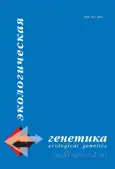Investigations of possible horizontal gene transfer from Agrobacterium to some representatives of the family Solanaceae
- Authors: Kulayeva O.A.1, Matveeva T.V.2, Lutova L.A.2
-
Affiliations:
- All-Russia Research Institute for Agricultural Microbiology
- Saint-Petersburg State University
- Issue: Vol 11, No 2 (2013)
- Pages: 3-9
- Section: Articles
- URL: https://bakhtiniada.ru/ecolgenet/article/view/2452
- DOI: https://doi.org/10.17816/ecogen1123-9
- ID: 2452
Cite item
Full Text
Abstract
Full Text
##article.viewOnOriginalSite##About the authors
Olga Alekseyevna Kulayeva
All-Russia Research Institute for Agricultural Microbiology
Email: koa1983@yandex.ru
Candidate of Biological Sciences, Laboratory of molecular and cellular biology
Tatiana Valeryevna Matveeva
Saint-Petersburg State University
Email: radishlet@gmail.com
Candidate of Biological Sciences, Senior Researcher
Lyudmila Alekseyevna Lutova
Saint-Petersburg State University
Email: la.lutova@gmail.com
Doctor of Biological Sciences, Professor. Deptartament of Genetics and Biotechnology
References
- Литература
- Антонова О. Ю. 2006. Полиморфизм органельных ДНК у сортов картофеля, видов рода Solanum секции «Pеtоtа» и межвидовых соматических гибридов: Дис.. канд. биол. наук: 03.00.15 СПб., 149 с.
- Байдербек Р. 1981. Опухоли растений. Проблема развития растений. Пер. с нем. Твердый переплет. 304 с.
- Aoki S. 2004. Resurrection of ancestral gene: functional and evolutionary analyses of the Ngrol genes transferred from Agrobacterium to Nicotiana // J. Plant. Res. Vol. 117. P. 329–337.
- Dellaporta S. T., Wood J., Hicks, 1983. Plant DNA minipreparation // Plant Molecular Biology Reporter. Vol. 1 P. 19–21.
- Draper J., Scott R., 1988. Plant genetic transformation and gene expression. A laboratiry manual. Blackwell Scientific Publications. — 408 p.
- Frundt C., Meyer A. D., Ichikawa T., Meins F. J., 1998. A tobacco homologue of the Ri-plasmid ORF13 gene causes cell proliferation in carrot root discs // MGG. Vol. 259, N 6. P. 559–568.
- Furner I. J., Huffman G. A., Amasino R. M. et al., 1986. An Agrobacterium transformation in the evolution of the genus Nicotiana // Nature. Vol. 319. P. 422–427
- Intrieri M. C., M. Buiatti., 2001.The horizontal transfer of Agrobacterium rhizogenes genes and evolution of the genus Nicotiana // Mol. Phyl. Evol. Vol. 20, N. 1. P. 100–110
- Matveeva T. V., Bogomaz D. I., Pavlova O. A. et al., 2012. Horizontal gene transfer from Agrobacterium to the plant Linaria in nature // MPMI. Vol. 25, N 12. — P. 1542–1551.
- Matveeva T. V., Lutova L. A., Bogomaz D. I., 2006. Search for T-DNA like sequences in plant genomes, using degenerate primers and probe // Biotechnology in the Agriculture and Food Industry. Nova Science Publishers Inc. — Chapter 17. — P.101.
- Matveeva T. V., Lutova L. A., Wood D., Nester E. W., 2003. Search for sequences homologous to Agrobacterium T-DNA in different plant genomes // Biology of Plant-Microbe Interactions. Vol. 4. P. 526–529
- Meyer A. D., Ichikawa T., Meins F., 1995. Horizontal gene transfer: regulated expression of a tobacco homologue of the Agrobacterium rhizogenes rolC gene // MGG. Vol. 249. P. 265–273.
- Murashige T., Skoog F., 1962. A revised medium for rapid growth and bioassay with tobacco tissue culture // Physiol. Plant. V0l. 15. P. 473–497
- Peralta I. E., Knapp S, Spooner D. M., 2006. Nomenclature for wild and cultivated tomatoes // Rep. Tomato Genet. Coop. — Vol. 56. — P. 6–12.
- Sambrook J., Fritsch E. F., Maniatis T., 1989. Molecular cloning: a laboratory manual // New York: Cold Spring Harbor Laboratory Press. 723 p.
- Schell J., Van Montagu M, De Beuckeleer M. et al., 1979. Interactions and DNA transfer between Agrobacterium tumefaciens, the Ti-plasmid and the plant host // Proc. R. Soc. Lond. B. Biol. Sci. Vol. 204. P. 251–266
- Schell J., Van Montagu M., 1977. The Ti-plasmid of Agrobacterium tumefaciens, a natural vector for the introduction of nif genes in plants? // Basic Life Sci; Vol. 9. P. 159–179.
- Thieme R., Rakosy-Tican E., Nachtigall M. et al., 2010. Characterization of the multiple resistance traits of somatic hybrids between Solanum cardiophyllum Lindl. and two commercial potato cultivars // Plant Cell Report. Vol. 29. P. 1187–1201.
- Thieme R., Darsow U., Gavrilenko T. et al., 1997. Production of somatic hybrids between S. tuberosum L. and late blight resistant Mexican wild potato species // Euphytica. Vol. 97. P. 189–200.
- White F. F., Garfinkel D. J., Huffman G. A. et al., 1983.Sequence homologous to Agrobacterium rhizogenes T-DNA in the genomes of uninfected plants // Nature. Vol. 301, N 5898. P. 348–350.
- White F. F., Taylor B. H., Huffman G. A. et al., 1985. Molecular and genetic analysis of the transferred DNA regions of the root-inducing plasmid of Agrobactefium rhizogenes // J. Bacteriol. Vol. 164. P. 33–44.
- White F. F., Ghidossi G., Gordon M. P., E. W. Nester, 1982.Tumor induclion by Agrobacterium rhizogenes involves the transfer of plasmid DNA to the plant genome // Proc. Natl. Acad. Sci. USA. Vol. 79. P. 3193–3197.
Supplementary files






